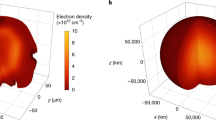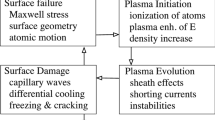Abstract
RECENT measurements of Townsend ionization coefficients by Prasad and Craggs1 in these laboratories have revealed large variations in the values obtained for the secondary ionization coefficient γ in discharge gaps in air containing water vapour. For example, in humid air at a total pressure of 150 mm, mercury with a partial pressure of 15 mm. mercury of water vapour, its value for a ‘Dural’ cathode is 7.5 × 10−8 at E/p = 45 V./cm./mm. mercury as compared with a value of 2.3 × 10−8 in dry air at the same total pressure and electric field.
This is a preview of subscription content, access via your institution
Access options
Subscribe to this journal
Receive 51 print issues and online access
$199.00 per year
only $3.90 per issue
Buy this article
- Purchase on Springer Link
- Instant access to full article PDF
Prices may be subject to local taxes which are calculated during checkout
Similar content being viewed by others
References
Prasad, A. N., and Craggs, J. D., E.R.A. Report L/T390.
Weissler, G. L., “Handbuch der Physik”, 21, 304 (1956).
Raether, H., Proc. Third Internat. COngr. Ionization Phenomena in Gases, Venice, 1957, p. 859.
Author information
Authors and Affiliations
Rights and permissions
About this article
Cite this article
MEEK, J. Secondary Ionization in Humid Air. Nature 183, 1805–1806 (1959). https://doi.org/10.1038/1831805a0
Issue Date:
DOI: https://doi.org/10.1038/1831805a0
Comments
By submitting a comment you agree to abide by our Terms and Community Guidelines. If you find something abusive or that does not comply with our terms or guidelines please flag it as inappropriate.



